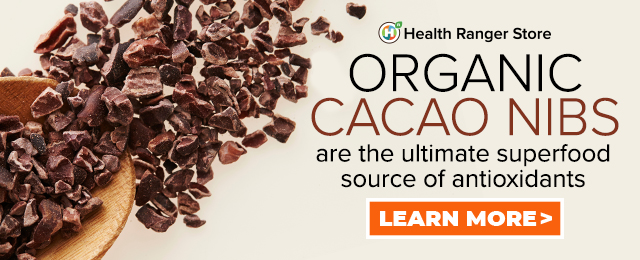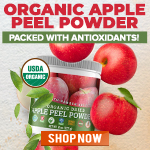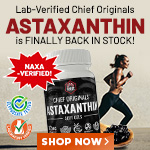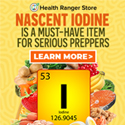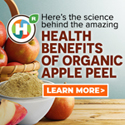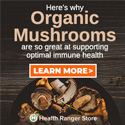
Two Fruits may Change the Face of Breast Cancer
Thursday, June 24, 2010 by: Wendy Rae
Tags: breast cancer, fruits, health news
- Aerosolized bioweapons? Strange “diploid biomasses” falling out of the sky in Florida captured under the microscope
- When antibiotics are unavailable, natural ANTIMICROBIAL compounds become essential first line defenses against infection
- German researchers find link between mRNA vaccines and GENETIC CHANGES that precede CANCER and AUTOIMMUNE DISORDERS
- Exclusive: Microscopic analysis suggests unknown biological contaminants falling from the sky
- DEATH by 12 VACCINES SIMULTANEOUSLY: Doctor playing catch-up on jabs injects 1-year-old baby with massive combination of dirty vax cocktails
- FBI imposed gag order on agents to silence Hunter Biden laptop truth before 2020 election, new chat logs reveal
- Newly released JFK files reveal Pentagon's role in creating Lyme disease and covid in the same lab
- Nature's liver guardian: Milk thistle's timeless antidote to modern toxin overload
- “Project Aldrin”: Senate probes Meta's alleged censorship dealings with China
- European Court of Justice: Healthcare professionals who promoted or administered COVID-19 vaccines are CRIMINALLY LIABLE for any harm caused
- “Bankrupt Tesla” movement EXPOSED: Left-wing extremists, Biden-linked operatives target Elon Musk in coordinated attack
- How the Vaccine Industry escaped accountability for nearly FOUR DECADES, endangering children’s lives for false hopes of protection
- NASA, State Dept. admit to renaming DEI programs to dodge Trump's ban in undercover sting
- The dark legacy of the U.S. government’s UNETHICAL medical and military research
- HAZARDOUS WASTE JABS: Vaccines are classified as “hazardous waste” if dropped on the floor, but as “medicine” when injected into your child
- Sleep shortfalls and silent brain decline: How poor sleep patterns may herald Alzheimer's risk
- “The Message of the Sphinx”: Did a lost civilization build the Giza monuments?
- Astaxanthin: Nature’s ultimate antioxidant powerhouse
- Newly released JFK files reveal Pentagon's role in creating Lyme disease and covid in the same lab
- Oncologist warns of ‘terrifyingly aggressive’ cancers in children, linked to immune suppression from COVID vaccines
- Kiss Your Genetic Privacy Good-Bye! 23andMe Gets Green Light to Sell Your Intimate Genetic Details to Anyone They Want
- European Court of Justice: Healthcare professionals who promoted or administered COVID-19 vaccines are CRIMINALLY LIABLE for any harm caused
- Analysis: The coming economic collapse, a mass uprising and Trump's three secret weapons to halt the growing revolt
- Woman contracts WORLD'S DEADLIEST VIRUS after unknowingly being given the WRONG VACCINE
- Sugar-free deception: Artificial sweeteners hijack hunger signals, fuel obesity epidemic, study warns
- NIH study, buried for decades, reveals that Flu Shots INCREASE elderly deaths, not prevent them
- Britain’s descent into police state censorship: Parents raided for questioning their daughter’s school system online
- AI weather model outperforms traditional forecasts, boosts accuracy by 20%
- Aerosolized bioweapons? Strange “diploid biomasses” falling out of the sky in Florida captured under the microscope
- DARPA: The shadowy innovator behind the world’s most advanced military technologies
- The Health Ranger releases “Vaccine Zombie” song and music video, using AI-animated zombies for the music video
- Utah governor allows ban on LGBT pride flags in public buildings and schools, will take effect without his signature
- COVID-19 scandal linked to CANCER SURGE: Billionaire researcher sounds alarm
- Musk targets “strangely wealthy” lawmakers in DOGE probe, names Pelosi, McConnell, Schumer
- Dr. Suzanne Humphries makes bombshell appearance on Joe Rogan podcast, exposing vaccine industry deception back to POLIOMYELITIS
- Ancient kitchen secrets REVEALED: How garlic, ginger and green onions fight cancer and heart disease
- Newly released JFK files reveal Pentagon's role in creating Lyme disease and covid in the same lab
- California's social media censorship law struck down: A victory for free speech or a threat to online safety?
- EPA advisor admits the agency is funneling billions to climate groups ahead of Trump’s return to White House
- Dr. Mike Yeadon releases 15-minute testimony - WATCH - about genocidal intent of COVID “vaccines”
- The Health Ranger releases “Vaccine Zombie” song and music video, using AI-animated zombies for the music video
- Florida takes a stand: DeSantis proposes permanent ban on mRNA vaccine mandates
- Rep. Nancy Mace introduces bill to ban biological males from female facilities on federal property
- Mike Adams releases country western hit single: Goin’ Back in Time is Comin’ Home
- Sugarcane extract superior to cholesterol-lowering drugs?
- Survival 101: Effective EMF blocking techniques
- “Why we influenced the 2020 elections”: Facebook files reveal the coordinated effort to bury the Hunter Biden laptop story
- Unpacking the Lies That We’ve Been Fed – new song and music video released by Mike Adams, the Health Ranger
- House Intelligence Committee calls for the ARREST and PROSECUTION of Dr. Anthony Fauci
- The pandemic as a tool for INDOCTRINATION: Understanding “The Indoctrinated Brain” by Dr. Michael Nehls
- Mike Adams releases music poetry sensation: A Child of God
- OpenAI whistleblower who dissented against how the company trained ChatGPT found dead
- Attorney and TikTok influencer explains how he was offered hundreds of dollars to make false claims about Trump, Republicans
- CONSERVATIVES SOUND THE ALARM: Big Pharma and the Left trying to force $32 billion money grab from America’s seniors into year-end spending deal
- Red Cross issues warning to stop blood plasma donations from vaccinated people
- Scientists confirm: GENIUS brain function can be spontaneously unleashed in humans without any apparent cause
- EPA advisor admits the agency is funneling billions to climate groups ahead of Trump’s return to White House
- HYSSOP: What research reveals about the health benefits of this ancient holy herb
- Two containers with completed ballots fall out of truck in Florida
- Fully vaccinated about to see “tsunami” of illness and death, warns virologist
- Global leaders unite to clamp down on “misinformation” with UN-backed Cascais Declaration
- BREAKING: 2025 NDAA authorizes mandatory military draft of WOMEN across America… as Pentagon pursues global NUCLEAR war with both Russia and China at the same time
- Michael Yon warns of a ZIONIST TAKEOVER in Trump’s second administration
- Ozempic and Wegovy weight loss drugs are injectable LIZARD VENOM PEPTIDES that may unleash a devastating wave of organ failure… side effects align with symptoms of SNAKE BITES
- BOMBSHELL: DNA testing kits are a SCAM to develop ethnic-specific bioweapons
- Newly released JFK files reveal Pentagon's role in creating Lyme disease and covid in the same lab
- Israeli soldiers accused of even more torture and abuse in the West Bank
- These 13 countries just signed an agreement to engineer a global FAMINE by destroying food supply
- NASA admits that climate change occurs because of changes in Earth’s solar orbit, and NOT because of SUVs and fossil fuels
- The Health Ranger releases “Vaccine Zombie” song and music video, using AI-animated zombies for the music video
- RFK Jr. clears key hurdle: Sen. Susan Collins backs controversial HHS nominee, signaling a new era for health policy
- Sermon 30: How Jesus reveals Caesar’s FAKE CURRENCY and FALSE AUTHORITY
Dr. Luis Cisneros-Zevallos of AgriLife Research explained they used two common methods that scientists often use to indicate the levels of antioxidants present. This method of testing helped guide them to the the two selected fruit varieties: "Rich Lady" peaches and "Black Splendor" plums. Cisneros-Zevallos further stated, "We can say that these were among a group of peach and plum varieties with high antioxidant content. However they were not necessarily the highest ones."
Another study done by European Food Research and Technology in 2007 tested 3 different peach varieties, testing the antioxidant levels, Vitamin C levels, and how the body trapped free radicals after ingestion. All three varieties tested ended up with similar profiles except for one variety of peach called "Luisa Berselli," which indicated a higher level of ability to trap free radicals. It seems not every peach is equal in its nutrient value.
The scientific name of peaches, Prunus persica, originated from an old European belief that peaches were indigenous to Persia. It is now believed that peaches originated from China. Plums carry the scientific name of Prunus; they were believed to have originated from Mesopotamia.
Historically throughout natural therapies, peaches have been used to treat bronchitis, coughing, dandruff, diabetes mellitus, kidney stones, and renal stones while plums were used to treat acne, bowel obstruction, constipation, diarrhea, fatigue, inflammation of the tonsils, liver enlargement and mouth ulcers to name a few.
Peaches with the skin are a good source of Potassium, Phosphorus, Magnesium, and Calcium while providing essential Vitamins A, C, Niacin, and Folate. Plums have a similar nutritional profile as peaches except they contain higher levels of Calcium, Vitamin A, and Folate.
Buying organic peaches and plums is an important factor in choosing wisely. The Environmental Working Group did a study of pesticide residues left on produce after washing. Peaches were the second most contaminated fruit with plums showing down the line at number eighteen. "We've found that washing doesn't do much," says Amy Rosenthal of The Environmental Working Group in a recent CNN report, "Peeling can help, although you have to take into account that the pesticides are in the water, so they can be inside the fruit because of the soil."
SOURCES:
http://www.sciencedaily.com/releases/2010/06...
http://pubs.acs.org/doi/abs/10.1021/jf900259...
http://pubs.acs.org/doi/abs/10.1021/jf900385...
http://www.healthalternatives2000.com/fruit-...
http://www.mamaherb.com/plum
http://www.mamaherb.com/peach
http://en.wikipedia.org/wiki/Plum
http://en.wikipedia.org/wiki/Peach
http://www.cnn.com/2010/HEALTH/06/01/dirty.d...
http://www.foodnews.org/fulllist.php
About the author
Wendy Rae is an herbalist, wellness coach, and yoga instructor who loves to share information on the healing properties of plants and foods. Her website is http://www.Wendy-Rae.comBreast cancer at FETCH.news
Get independent news alerts on natural cures, food lab tests, cannabis medicine, science, robotics, drones, privacy and more.
Take Action: Support Natural News by linking to this article from your website
Permalink to this article:
Embed article link: (copy HTML code below):
Reprinting this article:
Non-commercial use OK, cite NaturalNews.com with clickable link.
Follow Natural News on Facebook, Twitter, Google Plus, and Pinterest
Science News & Studies
Medicine News and Information
Food News & Studies
Health News & Studies
Herbs News & Information
Pollution News & Studies
Cancer News & Studies
Climate News & Studies
Survival News & Information
Gear News & Information
News covering technology, stocks, hackers, and more



"Big Tech and mainstream media are constantly trying to silence the independent voices that dare to bring you the truth about toxic food ingredients, dangerous medications and the failed, fraudulent science of the profit-driven medical establishment.
Email is one of the best ways to make sure you stay informed, without the censorship of the tech giants (Google, Apple, Facebook, Twitter, YouTube, etc.). Stay informed and you'll even likely learn information that may help save your own life."
–The Health Ranger, Mike Adams











